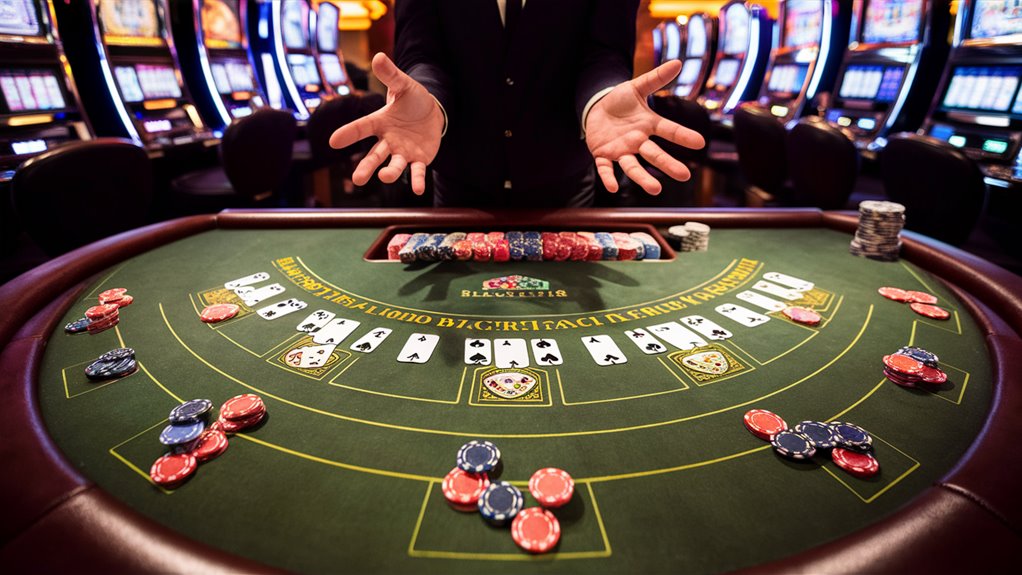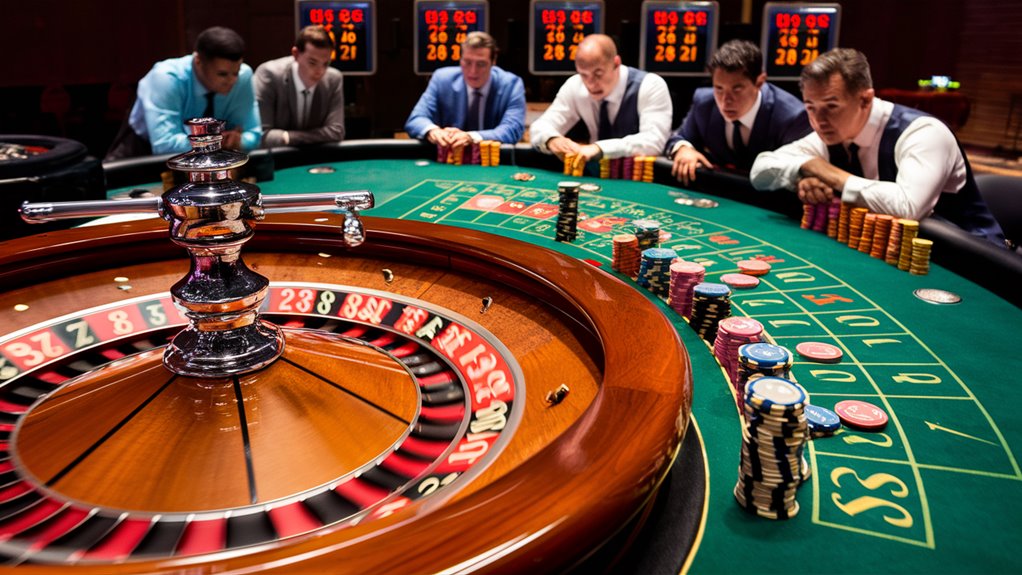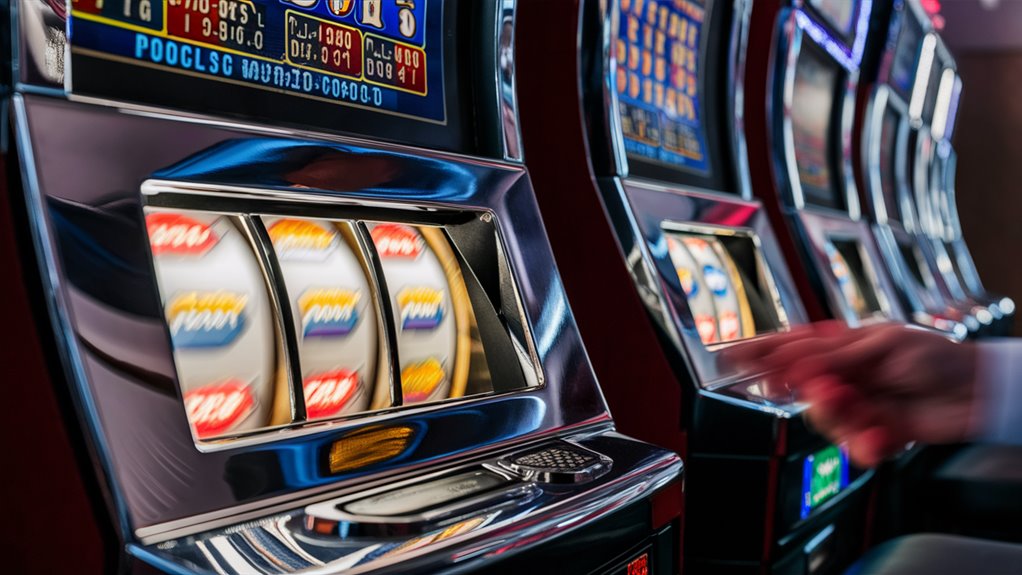
How Casinos Make Money with Math

Casino math is key to the gambling world, letting places keep making money by knowing the odds. By using probability and stats, they turn games that look random into sure money-makers.
House Edge and Chances
The house edge is the casino’s built-in math perk in every game. Take American roulette, for instance: the casino has a 5.26% edge because they pay 35:1 when the real odds are 37:1. This small gap means big profit over time.
Math Tools Used
Casinos use deep math ideas like: 공식 검증 방법 보기
- Random number creators for digital games
- Law of big numbers for long-term money-making
- Expected value to see if a game brings in cash
- Variance measures to handle ups and downs
How Math Makes Money
Even if some players win now and then, casino math means profit with enough games and time. The house perk, plus loads of plays, equals steady cash flow. This shows how probability shifts gambling from pure luck to a sure thing over time.
Casinos use smart programs and stats models to set up:
- Where to put games
- How payouts are structured
- Risk controls
- Keeping track of player habits
This math helps keep the casino winning, while still offering fun within set limits.
Learning About House Edge
Getting How House Edge Works
Math Behind Casino Cash
The house edge is the math bonus baked into every casino game that keeps them gaining money steadily. It works using exact probabilities and value guesses. Casino games always have payouts lower than the real win chances, stacking the odds against players.
A Roulette Edge Case
With American roulette, the clear math shows their edge. With 38 possible spots but payouts at 35 to 1, they lock in a 5.26% house edge. The edge is figured by:
House Edge = (True Odds – Payout Odds) ÷ True Odds × 100
Varying Edges in Games
Different games have different edge rates:
- Blackjack: Low at 0.5% with good play
- European Roulette: 2.7% edge
- Slots: Can go over 15%
- Baccarat: About 1.06% on banker bets
Knowing these math chances helps players see how casinos stay up despite ups and downs. The house edge means casinos keep making money from math certainty over many games.
Math in Casino Games
Understanding Casino Math Chances
Main Math Ideas in Gambling
Casino games run on tough chance rules and math ideas that control every bet and result. These key ideas set both player chances and house perks across all kinds of games. Probability is the math that helps casinos predict results and stay profitable.
Chances for Each Game
Roulette Chance Details
In American roulette, each spin has a 1/38 chance for each number, with a 35:1 payout – this math gives the house its edge. This chance gap between real and payout odds secures regular casino cash.
Each Card Counts in Blackjack
Blackjack depends on what cards have been played already, changing the odds with each card dealt. This linked chance shifts player and dealer odds all through the game, making blackjack a game of shifting chances.
How Slots Work
Today’s slot machines use smart random number creators (RNGs) to give millions of possible results. Every symbol is weighted in chance, letting them figure the exact expected payouts (RTP). With the law of big numbers, these well-set chances mean the house keeps an edge over many plays.
Using Sophisticated Math
The blend of expected chances with real results shows that casinos use math to keep predictable earnings. While day-to-day results can vary, big picture outcomes match the math, keeping casinos in business.
Deep Stats for Slot Machines
Deep Stats Driving Modern Slots

Getting RNG and Math Basics
Modern slots use advanced random number creation to make thousands of number mixes every second. These digital slot formulas work with carefully set chance tables to decide game results. Every symbol gets a set chance weight, with rare symbols set for less frequent show-ups.
Chance Setup and Symbol Chances
The math behind slots relies on structured chance setups. Big-win symbols might show up once in 50,000, while common ones pop up more, like 1 in 8 chances. This smart symbol chance keeps prizes controlled while the game stays fun.
Payouts and Play Patterns
Figuring RTP
Return-to-player rates from 85% to 98% show long-term outcomes over millions of spins. These payout formulas use the law of big numbers to make sure casinos keep winning but also give fair paybacks.
How Often Wins Come
Slot game swings affect how often and how much they pay. Bigger-swing games give big wins but not often, while steady ones give small winnings more often. This math balance shapes player experiences while sticking to pre-set pay rates.
[End of revised content]
How Random Number Tech Works
Inside Casino Random Number Tech
The Heart of Modern Casino RNG
Modern casino random making depends on top-level coding and set start points to create results no one can guess. These high-end systems keep both real and online casinos fair for all.
The Base of Casino RNGs
Pseudo-random number makers (PRNGs) build on systems that use tiny time reads and hardware noise as starting points. Through complex math changes, these beginnings make number mixes that stay unpredictable and meet strict rules.
Safety and Checking Steps
Many Safety Layers
Casino RNG setups use many security coats and are checked often by outside labs. These full safety steps stop tricks and make sure game results stay random.
Tests They Must Pass
Every RNG system must clear tough stats tests, checking:
- How spread out the results are
- If patterns show up
- Sequence correctness
- Chance checks
All the Time Action
The RNG system keeps making numbers non-stop, making thousands each second, no matter if games are being played. This non-stop work makes sure results stay fully random and stops any chance of guessing or messing with the system.
Rules and Proving It’s Fair
Modern casino RNGs have to meet tough rules and get a thumbs-up from testing places. They are checked often to make sure they keep following all the fair play rules and rules from around the world.
Math in Making Games
Math Basics in Making Casino Games
Getting Casino Game Math
The core of making casino games relies on chance math and stats to make balanced games with well-set pay chances and house edges. These math rules are what make all the games work while making sure businesses keep making money.
Main Math Parts in Game Making
Expected Value and House Edge
Value guesses make up the key house edge, which is usually 0.5% to 15%. This edge gets its shape from tight math modeling of rules and pay setups to keep making money in the long run.
Variance and How It Feels to Play
Stats swings help balance keeping players around with the casino’s cash needs. Good swing levels make the game fun while keeping profits steady. This careful mix stops both fast big money losses that make players leave and long play times that could hurt casino cash. How Gambling Can Affect Your Credit Score and Finances
Setting Win Chances Right
Win chance math, figured as how often wins happen compared to all tries, needs smart setting. Top games hold win chances between 20% and 45%, giving enough good news to players while making sure the math keeps profits sure. These well-set chance rules change what seems like random luck into sure long-term money for casinos.
Math in Making Games
Deep chance ideas let game makers build games where the calculated luck follows strict math rules. This planned way makes sure casinos keep making money while giving players well-controlled fun times through well-thought-out math setups.


